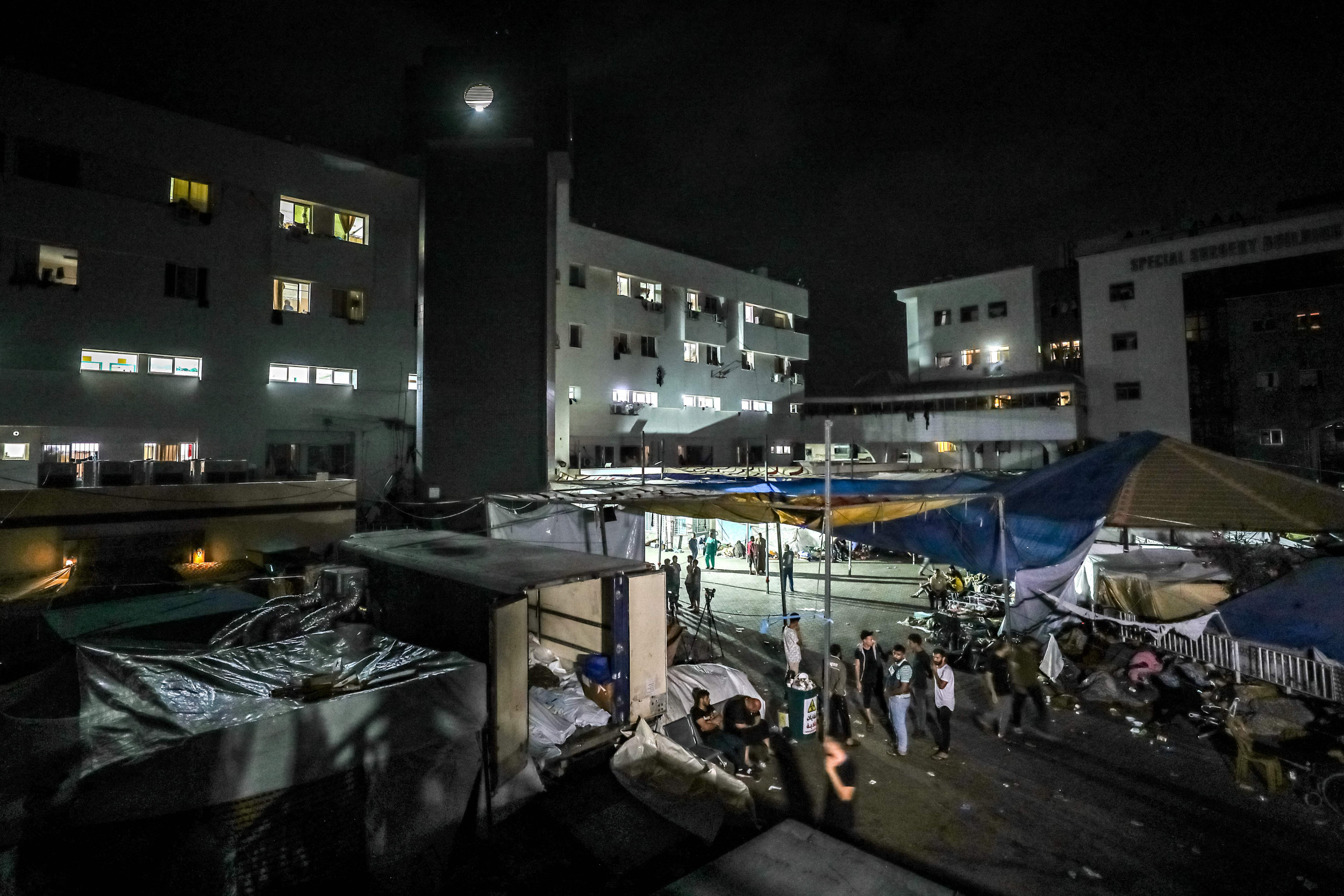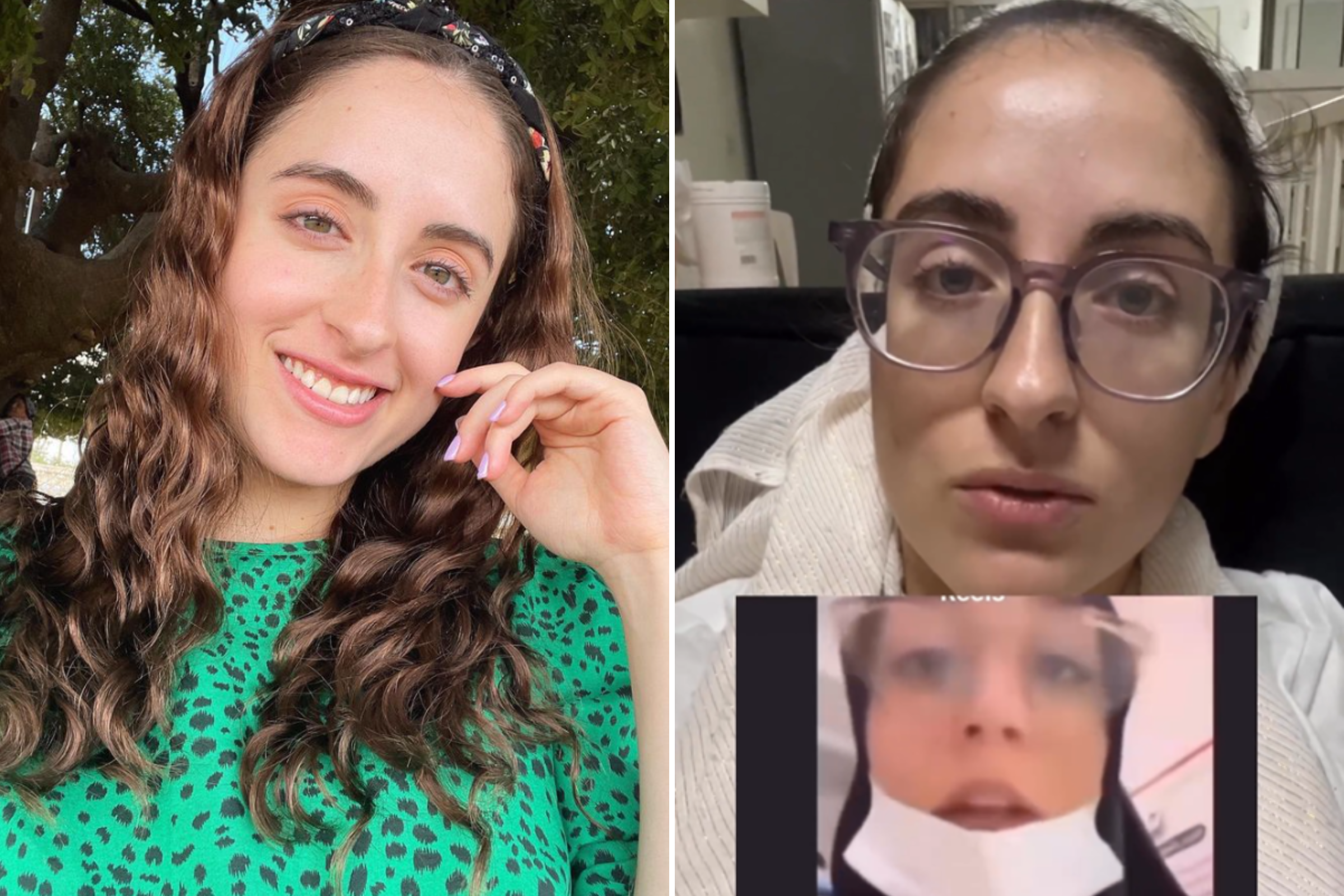Israeli Influencer Denies Playing Gaza Nurse in Viral Video
An Israeli influencer has denied accusations that she pretended to be a nurse at Gaza's Shifa hospital in a video that went viral on social media.
Hannah Abutbul, a 26-year-old content creator based in Israel, was targeted online over a video that purportedly showed a nurse warning others about Hamas "taking over" and stealing fuel from the hospital.
The Israel Defense Forces (IDF) have targeted Gaza's biggest medical facility which they said was the site of a Hamas command center, a charge denied by the group.
Abutbul told Newsweek she was not in the video and is ready to "sue the people who defamed me."
Israeli content creator Hannah Abutbul has denied playing a nurse in a viral video who claimed that Hamas was "taking over" Shifa Hospital. Pictured above are Abutbul in 2022 and a screengrab from Abutbul responding to the claim in November 2023. Hannah Abutbul/InstagramThe viral video, mainly in English, shows a woman, said to be a nurse, urging people in the Shifa hospital to leave, claiming that Hamas had taken over the hospital, stealing fuel and medicine. What sounds like explosions can be heard in the background.
At several points during the film, the woman appears to say a few words in Arabic.
"[Arabic] I can't believe I'm doing this, but the world has to know, has to know what Hamas is making here," they said.
"They're taking over the entire hospital, they're taking over the fuel, the medicine. I have nothing to treat with.
"I have to fix a fracture, for a five... a five-year-old boy without morphine because Hamas took it to themselves. [Arabic]. Please, if you hear me, please, leave, run away, don't stay here, please. [Arabic]."
How the Claims Spread Online
The original video was posted widely on November 11, 2023. One post by media commentator Edy Cohen has been seen 16.8 million times on X , formerly Twitter .
Translated via Google Translate, Cohen wrote: "The chilling testimony of a nurse from Shifa Hospital. 'The people of Hamas who attacked the hospital are stealing the fuel and the medicine.'
"This video should be distributed worldwide in all languages."
As soon as the clip began to spread, accusations were made that it was inauthentic.
Speaking to the It's A Lot podcast, comedian Bassem Youseff said the audio in the background sounded like "a fake explosion," noting how "everything behind her is so pristine and her gloves are so clean."
BBC Verify journalist Shayan Sardarizadeh, posted on X on November 12, that "The woman in the video doesn't appear to have an accent from Gaza, the sound of explosions seems fake, and real staff at Al-Shifa don't seem to know her."
The Intercept's Robert Mackey, an open source investigative journalist, also posted on X on November 12 , saying that "3 Doctors Without Borders/MSF staff currently at Shifa Hospital said today they've never seen the woman in this apparently fake video which was viewed +12 million times before being deleted from an Israeli gov't account."
1. I can report that 3 Doctors Without Borders/MSF staff currently at Shifa Hospital said today they've never seen the woman in this apparently fake video which was viewed +12 million times before being deleted from an Israeli gov't account. This closely echoes a 2011 hoax ... — Robert Mackey November 12, 2023Some claim the woman in the video is an actress called Hannah Abutbul, an Israeli-based content creator.
One post by , a known misinformation actor , posted on X on November 14, viewed 3.7 million times, said "Israelis had her pretend she was a Gaza doctor discouraging people from going to hospital! Pure Evil Liars."
A post by U.K. rapper Lowkey, on November 14, since viewed 2 million times, echoed the claim the person in the video was Abutbul.
Some identified Abutbul as Ximena Orozco , a Mexican actress with credits on iMDB.

Who Is Hannah Abutbul?
Abutbul told Newsweek via Instagram that she moved to Israel from Mexico three years ago to study Judaism and fell in love with the country.
Abutbul confirmed she acted under the name Ximena Orozco , but changed her first name when she converted to Judaism and her surname when she married.
She also told Newsweek she works for Aish.com, a division of the Jewish outreach organization, yeshiva, and seminary Aish HaTorah. Set up in 1974 by Rabbi Rav Noach Weinberg, Aish HaTorah now has branches and campus centers across the globe.
Major public figures including Bill Clinton and late U.K. Prime Minister Margaret Thatcher praised Aish . The organization also co-founded with the Israel Foreign Ministry the Hasbara Fellowships , an association mentioned in some of the accusatory messages naming Abutbul.
Although Aish HaTorah describes itself as "apolitical ," it has published articles by Prime Minister Benjamin Netanyahu and produces broadly pro-Israel content.
Abutbul said she did not have "any contact with the government" and that "right now I only work at Aish."
Aish CEO Steven Burg confirmed Abutbul worked for its social media team, adding that the organization was "shocked and saddened" to witness social media attacks on her.
"After review, we can state with absolute certainty that Hannah is not the person in the video and neither she nor Aish or any of its affiliates has any connection to any aspect of its production or release," he added.
A report by France 24 stated its journalists had spoken to a source at Shifa Hospital who noted that "There are no red stethoscopes in Gaza culture," only gray and blue.
'Why Would I Make a Video Like This?'
Abutbul produces Spanish content for Aish via its AishLatino online and social media channels . She also has a significant social media presence elsewhere, with 128,000 followers on Instagram and 246,000 subscribers on YouTube.
"Why would I make a video like this, if I work in social media?" Abutbul said. "My face and my glasses are already well known on TikTok , obviously I wouldn't go out exposing my face."
Responding to claims she appeared in the video, she added: "It's clearly not me, I'm ready to make every proof of face recognition or whatever does it need [sic] to clean my name and sue the people who defamed me."
The person in the video, unlike Abutbul, appears to have a mole above their lip and their eyebrows arch differently. Their noses, particularly around the nostril, appear to be differently shaped too.
Abutbul released a denial video , posted on Instagram on November 14, writing alongside: "I don't have to prove anything to anyone, but many people don't have common sense..."
In her denial video, Abutbul said Hamas had tried to find someone "who looked similar to blame for making that fake video."
"Listen, I want you to watch this video of this poor Palestinian girl who is suffering," she said in Spanish during messages translated by Newsweek.
"Hamas couldn't handle it because the video went viral, so they had to find someone who looked similar to blame for making that fake video."
The video ends with Abutbul noting the "only thing that looks alike" was her glasses.
Although Abutbul mentioned Hamas, she said she does not know who produced the film. Her Instagram has since been tagged with several graphic photos and videos.
Linguists Spot Inconsistencies in Video Speech
Linguistics experts who spoke to Newsweek raised inconsistencies with the speaker's Arabic and Palestinian dialect.
Nada Elzeer, a lecturer in Arabic at London's SOAS University, said the person in the video sounded like "an Arab mocking people with a bad English accent," adding that they did not appear to decide whether to say "the" or "ze" when pronouncing definitive articles.
"Unlike what we see in this video, Arabs with a bad English accent are consistent," Elzeer said. "Either they can pronounce the 'th' sound, or they can't."
Elzeer said that the patterns of stress and intonation were "too weak," saying it was not "pronounced enough as you'd expect to hear in the Palestinian dialect."
She added: "The way she says get out, or etla'uu: this word contains two emphatic Arabic letters that are hard to pronounce for non-native speakers, the emphatic T, and the 'ain letter, which comes from the depth of the throat and with which my students continue to struggle up until and throughout their final year.
"The woman in the video can't pronounce either of them."
Christopher Lucas, a senior lecturer in Arabic Linguistics at SOAS, said while he felt there was no strong evidence that she is not a native speaker of Palestinian Arabic, there was "reasonably strong evidence that the woman is artificially Arabizing her English speech."
"I am not suggesting there is evidence that she is a native speaker of English or any language other than Arabic," Lucas said.
"I am suggesting that she is intentionally aiming to make her English sound more heavily accented here than it would be in other contexts, all else being equal."
Lucas added: "Note in particular her pronunciation of English 'th' (interdental) sounds. She renders many of these as sibilants (s, z), especially in slower, more careful speech.
"The only reason someone would do this would be if they lacked interdentals in their native language, this is indeed the case for urban Palestinian Arabic, and struggled to realize them correctly when speaking non-native English.
"A foreign sound is especially hard to pronounce in rapid, less carefully monitored speech.
"But there are several instances where the woman correctly pronounces interdentals in rapid speech, having pronounced them as sibilants in slower speech."
Lucas noted that the speaker changed between using a 'th' sound, as in "the world," "they're taking," "the medicine," and "without," alongside "ze" sounds such as "ze entire hospital," "zis," and "ze medicine."
"Taken together, the evidence points rather strongly to an attempt, only partially successful, by this woman to make her English speech sound more heavily accented than it would be under normal circumstances," he said.
Fatima Rawan, a senior lecturer in Arabic Language at the University of Exeter, also told Newsweek how pronunciation changed the meaning of some of the words.
"Instead of pronouncing "اطلعوا" to mean "get out," the speaker pronounced "اتلؤوا," which does not mean anything," Rawan said.
"This is typical of the type of inaccuracies a non-native speaker of Arabic would do and we usually penalize students who make such errors in oral exams.
"The pronunciation of sounds such as "ع" and "ط" in the above word is not accurate. This is consistent with the type of errors commonly made by learners of Arabic.
"The "ع" in this video sounds more like a voiceless glottal stop "ء". The speaker misses the deep vocal areas needed to produce the "ع" sound, which can be described as a voiced pharyngeal fricative sound.
"As for the pronunciation of "ط," this should be an emphatic velarized sound pronounced further back in the mouth which can be identified as having a voiceless post-dental emphatic stop.
"The speaker misses that and pronounces the sound of another letter "ت," which is a voiced aspirated stop with a lighter sound produced towards the front of the mouth with the tip of the tongue barely at the back of the teeth, just like the English sound "T" in "tea". In contrast, "ط" is a deeper sound which the speaker fails to produce accurately."
The Situation at Shifa Hospital
Following the Hamas attack on southern Israel on October 7 in which 1,200 people were killed and an estimated 240 taken hostage, Israel's bombardment of Gaza has killed at least 12,700 people, according to the Associated Press , with Shifa's plight of particular concern globally for humanitarian reasons.
As Newsweek has previously reported in a Fact Check, several outlets had reported that a bunker or basement had been built at Israel's discretion in the 1980s although whether Hamas has used it as a military headquarters has not been established.










